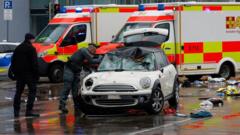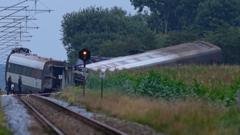The Munich car-ramming incident, involving an Afghan asylum seeker, prompts reactions from government officials and raises alarms just days before federal elections.
**Car-Ramming Incident in Munich Sparks Security Concerns Ahead of Elections**

**Car-Ramming Incident in Munich Sparks Security Concerns Ahead of Elections**
A disturbing car attack injures multiple people, reigniting debates on immigration and security in Germany.
Dozens of people were injured in a shocking car-ramming attack in Munich, with at least 30 individuals suffering injuries—some critically—just a week ahead of Germany's federal elections. The alleged perpetrator, a 24-year-old Afghan asylum seeker named Farhad N., was detained on the scene as police initiated a counter-terrorism investigation driven by reports of the suspect’s extremist connections.
This incident, occurring close to the Munich Security Conference with dignitaries, including Ukraine's President Zelensky and U.S. Vice President JD Vance, brought heightened tension to the city. The attack unfolded at a transport workers' union rally at around 10:30 local time, which is situated near the central train station. Eyewitnesses reported the horrifying sight of people fleeing into nearby shops as a car accelerated towards the crowd.
Chancellor Olaf Scholz emphasized that justice must be served and the driver must be deported. Just prior to the attack, the nation faced rising fears regarding security, particularly as it follows a series of attacks allegedly linked to immigrants. Bavarian Premier Markus Söder remarked that immediate changes are essential for Germany's safety, reflecting a broader urgency felt across the nation.
Public anxiety was palpable, as many recalled a deadly Christmas market attack in Magdeburg just two months prior, which left six dead and hundreds injured. With immigration and security issues dominating discussions around the upcoming elections on February 23, far-right parties like Alternative for Germany (AfD) are gaining traction, advocating for stricter measures against immigrants.
Further complicating the political landscape, Olaf Scholz has hinted at an increase in deportations of serious criminals from Germany, particularly targeting Afghan nationals. This comes in light of other violent incidents, including a stabbing that resulted in several deaths, further highlighting the complexities surrounding Germany's immigration policies and national security. As police continue to investigate this latest incident, experts worry that it may steer the electoral narrative toward tougher immigration stances.



















